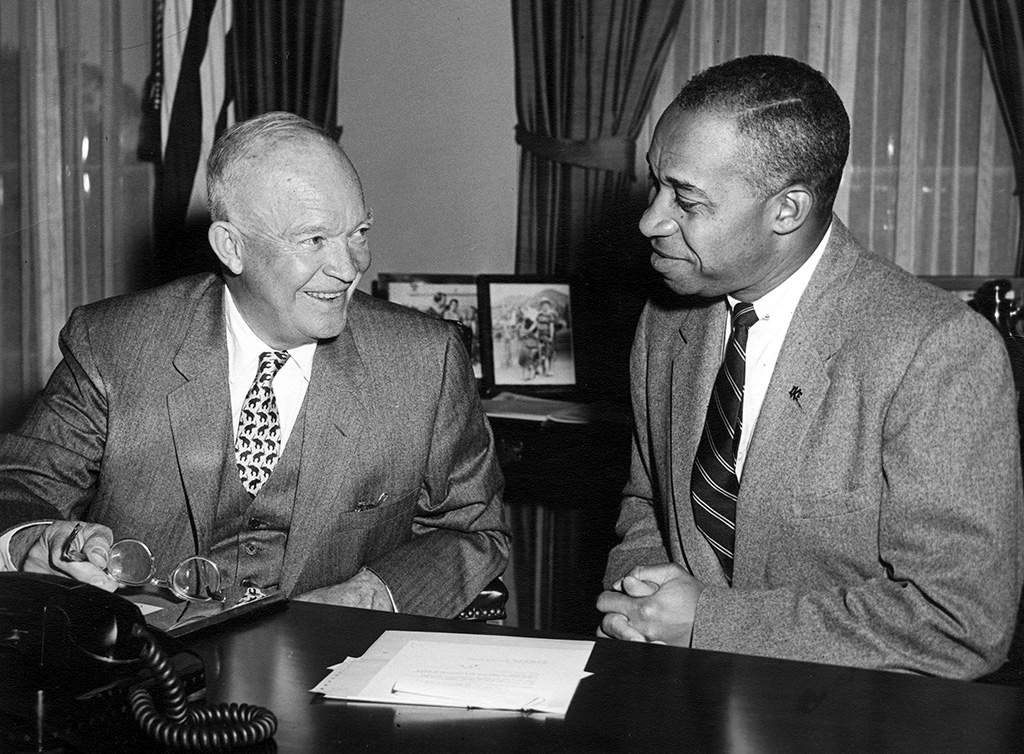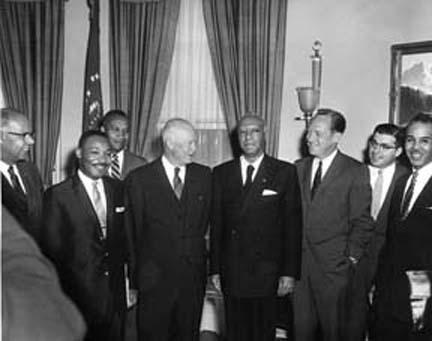
President Dwight D. Eisenhower with E. Frederic Morrow, the first African American to
ever hold an executive position in the White House.
[Courtesy of Dwight D. Eisenhower Presidential Library]
On New Year's Eve, 1957, E. Frederic Morrow was feeling humiliated. He had been assigned to assist in the writing of President Eisenhower's annual State of the Union Message but was given no chance at all to contribute to it. He desperately hoped, as he wrote, "not to begin the new year as a mere wart on the White House staff."
Mr. Morrow was one of President Eisenhower's White House aides. He is memorable for being unique among Ike's staff and for later slogging away at one of the Administration's most thankless of jobs. It's understandable why he may have felt a bit anxious and frustrated on that New Year's Eve, in 1957. Or, for that matter, at any time during his White House tenure. Morrow was black. He was the only African American to serve on Eisenhower's presidential staff, and the first ever in American history to serve as a presidential aide.
In his position, Morrow's job was to be a liaison between the White House and African American leaders, to keep the White House attuned to the pulse of the black community and to serve as cheerleader for the President and his policies.
The experience proved to be gradually ever more difficult and frustrating for Morrow.
He documented it all in his memoir, Black Man in the White House, published in 1963. First there was the prejudice he faced as a black man in the 1950s and even more so as the only black presidential staff person. His problems in the White House began straight away. He encountered difficulty trying to acquire a secretary from the White House secretarial pool because no one wanted to work for a black man. Finally, one woman volunteered to be his secretary "out of Christian charity." Then he found it next to impossible to find decent accommodations in the DC area. Any place designated as rentable to "Coloreds" was dismal and dilapidated. Any place even half-way appealing was restricted to white tenants only.
His run-ins with racism and bigotry continued throughout his White House years. In January 1957, he was invited to attend a pre-inaugural service at the President's place of worship - the National Presbyterian Church. Upon arrival, he was stopped and had his credentials checked over and over and over by assorted different ushers and then instead of being escorted to the roped off section in which the President and his staff were to sit, he and his wife were coolly ushered to a seat in the rear. One church member was overheard commenting to another, "He must be a high government official, because if he were not, he would never dare enter our church."
Unfortunately, the Administration didn't go out of their way to inform the public who Morrow was. When sent as the President's representative to a speaking engagement, for example, he was often treated by event organizers as some unknown minor underling dismissively foisted upon them by the White House. Typically, he was asked to cut down his remarks to a couple minutes to make more time for the "important" speakers. At the 1956 Republican convention, for example, his five minute speech was cut to two minutes and then never aired because the network cut to a commercial as soon as he began.
Even more disconcerting to Morrow was how his efforts to convince the administration to speak out for civil rights were routinely ignored. Early on, Cabinet Secretary Max Rabb told him that the Administration believed African Americans were being too aggressive in their demands and were lacking in gratitude for all the Administration had done for them. He bluntly informed Morrow that, "Most of the responsible officials in the White House had become completely disgusted with the whole matter." Morrow later mused that, "In effect he was telling me that I should walk softly from then on and ask fewer questions of the members of the Administration on this matter." And that, he stated, was the root of his inner conflict, a conflict he thought that one day might force him to resign his position: Here he was, an appointee of the Administration and loyal to the party and the President. His job was to dispassionately explain to the White House how African Americans felt about civil rights issues and conversely to African Americans what the Administration's policies were. "Yet," he writes, "I am also a Negro who feels heavily the ills that affect my race."
When leaders of the black community were anxious to talk with President Eisenhower, Morrow worked tirelessly to arrange a meeting. However, it seemed as though whenever he got close to having the White House finally schedule an appointment, his requests were most often denied. Meanwhile, White House staff members would be making speeches assuring white southerners they had little to fear from the Eisenhower administration on civil rights. It took him years, but he finally did succeed. In 1958, the President agreed to address a summit meeting of black leaders in Washington. But Morrow was dismayed when he heard the President urge the leaders to be "patient" in their hopes and efforts to gain equal citizenship. Morrow could tell by the expression on the faces in the audience that the comment was not at all well received and he imagined the response it would garner throughout the black community.

President Eisenhower met with prominent Civil Rights leaders on June 23, 1958.
Rev. Martin Luther King, Jr., stands second from left, while E. Frederic Morrow stands in rear.
[Courtesy of Dwight D. Eisenhower Presidential Library]
While Morrow's efforts were typically stymied in the White House, blacks at the same time gave him "hell" over the Administration's indifference to the plight of African Americans in the South. While African American churches and homes were being bombed and destroyed after the Supreme Court ruled that bus transportation in Montgomery must be integrated, the President had no forceful response. Blacks accused the President of giving far more attention to the Hungarians victimized by the Russians than blacks victimized by whites in our own country.
Blacks wrongly viewed Morrow as the President's civil rights advisor and thus held him responsible for what they considered the President's civil rights "blunders." When the President admitted in a press conference that there were aspects of his Civil Rights bill (being bitterly fought over in Congress) that he wasn't familiar with nor completely understood, Morrow was flooded with calls and letters from all over the country. Most criticized him for the Presidents' seeming lack of support for his own bill and his refusal to "assume the moral leadership of the country." There was even a letter from Jackie Robinson urging him to advise the President to veto the bill because Congress had revised and amended it to the point it was useless. After a while, Morrow dreaded even going to the office to have to face the barrage of call and letters.
Morrow's advice and concerns were not only often ignored by the Eisenhower White House, but also by Vice President Richard Nixon during his 1960 campaign for the presidency. When Martin Luther King, Jr. was thrown into an Atlanta jail shortly before the election, Morrow urged Nixon and his campaign managers to issue a statement denouncing the jailing. Yet they chose to do and say nothing. His opponent, John F. Kennedy, on the other hand, phoned Mrs. King to express his concern and wired the mayor of Atlanta. Twenty-four hours later MLK was released. With that gesture, Kennedy helped to secure more of the black vote and Nixon lost the election.
Morrow concluded his book expressing his frustration with the President, noting sadly how Eisenhower's "lukewarm stand on civil rights made me heartsick," and how "His failure to clearly and forthrightly respond to the Negro's plea for a strong position on civil rights was the greatest cross I had to bear in my eight years in Washington." But nevertheless, through the entirety of the book, Morrow made it evident that he retained the greatest respect and admiration for both the President and Vice President. He referred to both as being warm, friendly, decent, reasonable, courteous, astute, and practical minded. Even when most frustrated, he confessed that "if the President did not have the character, decency, and courageous spirit he has, it would not have been possible for me to be here in the first place or to have remained."
One of Morrow's most poignant stories was one that he did not include in his book but shared rather in an interview: The President, toward the end of his second term, had promised Morrow that he would consult with his corporate friends and see if he could round up a post White House job for him. Weeks later, the President approached Morrow at a dinner they are both attending. With tears welling up in his eyes, and with obvious disappointment and frustration, the President imparted to Morrow the news that despite his efforts, he was unable to secure him a decent position. He said, sadly, that corporate America was not yet ready to offer an African American a position of responsibility.
E. Frederic Morrow died in 1994 at the age of 88. After he left the White House, he became an assistant vice president for Bank of America and worked as an executive associate at the Educational Testing Service in Princeton. His book, Black Man in the White House, was referred to as "a political bombshell" in a New York Times book review.
|
February 03, 2021
|
Last updated: February 3, 2021
